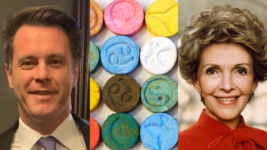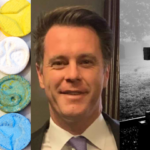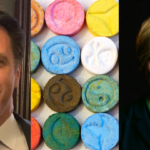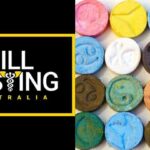Dozens of Festival Deaths “Potentially Preventable” With Pill Testing, Study Finds

A just released research paper inquiring into the circumstances of drug-related deaths at music festivals in this country, has found that 64 such fatalities transpired at events across Australia over the period from July 2000 until the end of 2019.
Produced by four academics, the Drug-Related Deaths at Australian Music Festivals report comes directly on the back of a mass overdose event at Melbourne’s Hardmission Festival on the first Saturday night of this year.
The incident triggered renewed calls for pill testing in Victoria, as well as in NSW, where premier Chris Minns has spent the last six months reneging on drug law reform election promises, including one to hold a drug summit, while he’s also ruled out pill testing pre- and post-recent festival deaths.
This new study “aimed to determine the frequency of deaths involving alcohol and other drugs at music festivals in Australia and to identify potential risk factors that may inform future harm reduction strategies”.
And researchers found that the drug-related deaths that were identified over the study period were “potentially preventable” if harm reduction interventions, such as drug checking services, had been available, while the majority of these festival deaths were attributable to MDMA toxicity.
Partying blind
The festival death report outlines that drug use amongst festivalgoers is “disproportionately high compared with the general population”, and for drug-related harms to arise at such events, is “not uncommon”.
Polysubstance use, or the use of a number of psychoactive substances at the same time, tends to be a factor in the majority of drug-related incidents at events. And the substance that is most likely to be involved in a drug harm incident is overwhelmingly alcohol, followed by MDMA-related cases.
Another factor leading to the Russian Roulette-type scenario when ingesting black-market illicit drugs are novel psychoactive substances (NPS), which are “synthetic molecules” designed to reproduce the effects of prohibited traditional drugs, and these can often be more harmful.
A widely reported multiple overdose event occurred in January 2017, at Melbourne’s Chapel Street nightclub precinct, which involved three deaths and 20 drug-related hospitalisations, due to a toxic batch of supposed to be MDMA or ecstasy caps, which turned out to contain the toxic NPS NBOMe.
The United Nations Office of Drugs and Crime Early Warning Advisory monitors the emergence of NPS, and since its inception in June 2013, the watchdog has identified 1,230 novel psychoactive substances to November 2023, which is roughly a new drug every week.
The authors further elaborate that “drug checking, or pill testing, allows the general public to submit drugs for toxicological analysis indicating the contents, dose, and purity of pills and powders, which may reveal potentially dangerous substances, promoting drug disposal and safer drug use”.
Indeed, it’s commonly understood amongst harm reduction experts that drug checking results in reduced drug use, as those who utilise such services and are informed that the drugs in possession could potentially be harmful, usually go on to throw them in the bins provided.
Preventable deaths
Researchers identified 64 drug-related deaths at Australian festivals between 2000 and 2019, with 74 percent of the deceased being male, with a median age of 23. Deaths are more likely to happen in inner city locations and they usually involve two or more substances, mainly alcohol and MDMA.
“The higher proportion of males dying from drug toxicity in this study is consistent with Australian studies reporting that up to two-thirds of drug-related deaths in Australia are male,” the report authors further outline.
The average festival drug-related death toll is around three lives lost annually. The majority occur in NSW, followed by Victoria. Yet, despite this, both these states have conservative pollies refusing pill testing. While Queensland authorised drug checking services last February, but they’re yet to begin.
Toxicology tests found that the most common substance detected in the system of those who died at festivals was MDMA, which was present in 42 of identified fatalities. Alcohol was the next most prevalent substance, and it was found in the system of 30 people who died at festivals.
The prevalence of MDMA in relation to these deaths, which has only increased recently, further shows that services to test drugs can easily assist in the prevention of harms, as MDMA is one of the least harmful drugs. However, high doses can prove fatal, and testing can reveal too strong a pill.
Regressive law enforcement
“Evidence supporting the use of specific law enforcement approaches at concerts and festivals is limited, with recent studies questioning their potential effectiveness in reducing purchase, supply, use or harm related to drugs,” the report authors make clear.
Drug detection dogs have been widely used at music festivals across the continent over the last two decades. Yet, this method of drug detention is highly flawed. And the report explains that the use of dogs continues despite multiple studies suggesting their presence increases drug-harms.
Former NSW MLC David Shoebridge sourced multiple sets of police statistics showing that searches resulting from a dog indication turn up nothing two-thirds to three-quarters of the time. And he further sourced data revealing that the dogs are increasingly being accompanied by strip searches.
The issue with festivalgoers being confronted by walls of blue bodies and dogs at events is that it leads to dangerous drugtaking behaviour, such as panicking and swallowing all one’s drugs at once, taking an excessive amount prior to arrival at an event or concealing substances in body cavities.
Dispelling the myths
“Countries such as the Netherlands have used drug checking for over three decades to understand the dynamic recreational drug market, providing toxicosurveillance data to the European Union Early Warning System, as part of the Drug Information and Monitoring System (DIMS),” the report reads.
Australia has one drug checking service in the ACT, the CANTest facility. And the report notes that “critics have questioned the analytical limitations of drug checking and its role in condoning drug use or providing patrons with a false sense of security over the contents of their drugs.”
Those critics can be found amongst the ranks of NSW Labor and the state Coalition, as while enlightened politicians sanctioned the trialling of pill testing in Canberra, which has now been extended due to its success, the majors’ MPs in this state prefer to bury their heads in the sand.
Report coauthor Dr David Caldicott told Sydney Criminal Lawyers at the time of CANTest’s unveiling, that “the service does not act as a ‘honey-pot’, as often misrepresented, and, in fact, it often results in change of behaviour, in a healthy way, regarding drug use”.
“The average MDMA concentration among these deaths was above a range usually associated with toxicity, highlighting an opportunity for the prevention of harm,” the report further sets out. And services also serves as a point of contact for medical professionals and people who use drugs.
And on receiving the results of the drug checking test, punters can then discuss them with staff on hand, while counsellors are also available for clients who might want to discuss their drug use in depth and bins are on hand for those who determine that taking their drugs is not worth the risk.
“Unlike many existing toxicosurveillance and harm reduction strategies, drug checking enables the detection of dangerous products before they are consumed, deterring use and preventing harm,” the report authors conclude.







